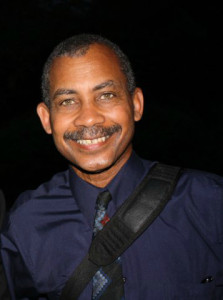Welcome to 826michigan’s tenth anniversary! In 2015, we’re celebrating ten years of 826michigan by highlighting ten people who have significantly shaped our organization since 826michigan opened its doors in 2005. Follow along with former 826michigan Communications Coordinator Amy Wilson this year as she explores how the contributions of many individuals have contributed to 826michigan’s evolution: from a tiny operation to a full-fledged nonprofit organization serving over 3,000 young people in Detroit, Ypsilanti, and Ann Arbor.
“I feel really really good to have been there at the beginning . . . to see where it started, and to know how far it’s come. I’m so happy to see that. Through 826michigan, I’ve formed friendships. And I’ve seen a lot of really good things.”
Last month for this project I talked to Jeannette Jackson, who shared her story of being a parent to students in 826michigan’s early programs. Our conversation made me think about how, in those very first days, the success of our organization was dependent on people – parents, students, volunteers, teachers, donors – who were willing to take a chance on something that was new, unusual, and a bit different from what they’d experienced before. That’s still important to us today.
Keith Hood, this month’s 10th Anniversary honoree, was part of 826michigan’s leadership from the beginning. As you’ll read, Keith took a very big chance by agreeing to join a Board of Directors for a brand-new nonprofit. Keith’s personal connection to our mission and his willingness to use outside resources, to self-educate, and to reach out to others laid a strong foundation for 826michigan.
This project is designed to highlight individuals but I think the story of 826michigan is also a story of the way groups of people come together in times and places to make something happen. It struck me that in Keith’s memory of the early years so much was focused on the pursuit of people who could work together amicably in pursuit of a common goal. Individuals have skills, and in groups they put them to work. I’m interested in how that theme recurs in my experience of 826michigan and maybe in yours too.
Let’s hear what Keith has to say.
“I basically grew up and was raised in Detroit. I lived in Detroit from the time I was born in 1953 to about 1972 — so I was in Detroit for about 19 years. I came to Ann Arbor in 1972 and have been in Ann Arbor ever since.
I’ve always been interested in helping, and I’ve always had an interest in helping writers. Before I was involved with 826michigan, I was working on my own writing. In 1999 I started a writing group called ‘Critical Connections Writers’ Workshop’. It started out as a writing group and it eventually turned into a nonprofit to run a writers’ conference. I formed the group really to help me as a writer, but in the process I was helping other writers. And that led to me running a writers’ conference for several years, where I brought in teachers to teach workshops and such. It was through that I originally met [826michigan founder] Steve Gillis, because we attended a writers’ group together.
When he offered me the thing about 826michigan, I looked it up. I did some research on the original 826 and I saw what Dave and Ninive were doing in San Francisco. It seemed like something admirable. I was helping people who had already expressed an interest in writing, but the idea of helping kids develop writing skills was really appealing me. That’s what intrigued me and made me interested in the organization — because the mission appealed to me.
What happened was, Steve recruited a bunch of his writer friends to be on the board of directors for the early organization. He invited about four or five to become board members and I was one of them. We were all novices at this kind of thing. We had our first board meeting, and it was kind of disorganized, and I don’t like going into anything not knowing what I’m doing.
At the time there was an organization called Nonprofit Enterprise at Work. They taught classes on how to run nonprofits and how to be a good member of a board of directors for a nonprofit organization. So I took some classes from NEW on how to be a board member, how a nonprofit should be run. I started getting books from the library, and bought some books on how boards should be organized. It didn’t take me too long to figure out that we were doing things all wrong.
And so NEW had a board recruitment aspect. If you were interested in being on a board of a nonprofit, and you had skills that a nonprofit could benefit from, you could volunteer to be on a list. And when nonprofits needed board members, they could go to this list and find people. I suggested to Steve that we take advantage of this opportunity, because we had all writers who knew nothing. I was beginning to understand that the way a board worked, you needed at least one attorney on the board. You needed an accountant. So I used NEW’s recruiting service to recruit some of the early board members, like Laura Wagner and Patrick Cooper. Lauren London. Angela Kujava came from there. And a few others. Then we started to build a professional board.
At the time, we really didn’t have a president. So we had put it out there at a meeting that we needed to get officers — president, vice president, secretary, et cetera. I thought about it and I said, I think I would make a decent president. So I stepped in. It was tough to find our way and to find people who would take our organization seriously. So we did a lot of transition in the early years.
By 2006 we had a really good solid working board. We were learning our way. But we needed a new Executive Director. And we had learned that there was a right way to do this — we were going to do it right, we were going to put out an ad, we were going to do a search, and we were going to interview candidates. So we did that, and that’s how we hired Amanda Uhle.
We didn’t have much funding in the early days. Our budget back then was 150k a year. I remember telling Amanda when we hired her, ‘We have no money, and we can pay you till the end of the year, and then at the end of the year, we’re broke.’ Amanda was fine with that, we hired her, and it’s been nothing but success.
It was really just getting good people, good quality board members. Finding a good Executive Director was key. We just really lucked out with Amanda. I was President of the board for the first three years for 826michigan.
It’s been heartwarming to see how well the organization has done. I feel really really good to have been there at the beginning. To have been there when it went from one or two people on the staff to however many you’ve got now! And the expansion into Detroit and everything.
But to see where it started, and to know how far it’s come. I’m so happy to see that. It’s like raising a kid: you don’t want to raise your kid until they’re 70 years old! You want to give them a start in life and be happy that they can stand on their own two feet. That’s how I feel about 826michigan. I was very involved in the early years and not so much anymore, and the organization has been doing so well without me. Through 826michigan I’ve formed friendships. And I’ve seen a lot of really good things.”
***
One of the main things we hope students can learn from participating in 826michigan’s programs is that every task, no matter how unimaginably large and difficult it seems at the beginning, can be accomplished by asking for help, working together, and using the resources available to you. Keith’s story reminds me that this lesson applies to more than science projects, book reports, or poems!
Next month, I speak with Carol Knight-Drain of the James A. and Faith Knight Foundation, whose support for 826michigan propelled us forward.
Amy Wilson is a writer living in New York City. From 2010-2014, she was a member of 826michigan’s staff.


